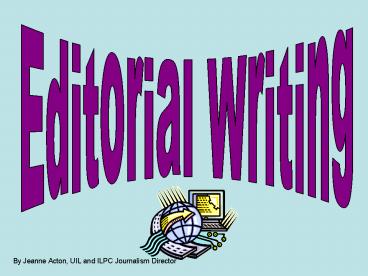Editorial Writing - PowerPoint PPT Presentation
1 / 18
Title:
Editorial Writing
Description:
By Jeanne Acton, UIL and ILPC Journalism Director Editorial An article that states the newspaper s stance on a particular issue. Basically, it is a persuasive essay ... – PowerPoint PPT presentation
Number of Views:1044
Avg rating:3.0/5.0
Title: Editorial Writing
1
Editorial Writing
By Jeanne Acton, UIL and ILPC Journalism Director
2
Editorial
An article that states the newspapers stance on
a particular issue. Basically, it is a persuasive
essay that offers a solution to a problem.
3
(No Transcript)
4
The HEAD of our Editorial
For example Starting in January, students
who are tardy to class will go directly to the
In-School Suspension room for that entire class
period and write an essay about why they were
tardy.
5
The NECK of our Editorial
For example This policy is unfair and is in
direct opposition to what school is about
learning.
What is your opinion???
6
The BODY of our Editorial
- Give three reasons why you are taking your stand.
- Missing an entire class because of a 30-second
tardy is not beneficial for students or the
school. - Students out of class means more work for the
teachers. - The ISS room is too small to hold a large number
of students.
7
An ARM of our Editorial
Support your arguments with evidence and
examples. Your English teachers call this
elaboration.
Missing an entire class because of a
30-second tardy is not beneficial for students.
School is supposed to be about learning. Sitting
in the ISS room writing an inane essay about why
you are tardy is not learning. Plus the school
could be hurt when students miss valuable class
time, and TAKS scores drop.
8
The other ARM of our editorial
Opposing viewpoints are rebutted. You shut down
the opposition.
The administration says the new policy will
give students the added incentive to get to class
on time. Getting out of class is an incentive for
many students especially on test day. Tardies
may very well increase with this new policy.
9
One LEG of our editorial
If you are going to complain about something, you
must have a better way of doing it.
The administration should consider
alternative punishments for tardies, such as
after-school detention and Saturday detention.
10
The other LEG of our editorial
The principal needs to change this new policy.
11
What went wrong?
- You didnt take a stand.
- The argument was trite and generalized. Be
specific to the situation. - You asked too many rhetorical questions without
stating an opinion. - You used quotes. One (maybe) quote is enough for
an editorial. You dont need any.
12
What went wrong?
- The wording was pompous or pretentious.
- You turned into a preacher.
- You got off topic.
- Your argument lacked credibility.
- You used stereotypes or made personal attacks.
13
What went wrong?
Starting in January, students who are tardy to
class will go directly to the In-School
Suspension room for that entire class period and
write an essay about why they were tardy. While
this plan has drawbacks, it is not all
bad. Students who are tardy are disruptive to
the entire class. Plus, since many teachers have
no consequences for tardy students, students have
little incentive to be on time. But sometimes
tardies can not be avoided. Sometimes the
restroom lines are long or a locker gets jammed.
Students should not be punished for some
tardies.
14
What went wrong?
Starting in January, students who are tardy to
class will go directly to the In-School
Suspension room for that entire class period and
write an essay about why they were tardy. While
this plan is not perfect, it is better than no
policy at all. Students come to school to learn.
To learn they need to be in class. Some classes
are not always exciting, but that doesnt change
a students responsibility. For example, a
student may not like physics, but he/she should
still be on time. Students need to do a better
job when choosing their class schedule. Then,
they will pick classes they enjoy rather than
ones they dread going to every day.
15
What went wrong?
Starting at the dawn of the new year, young
scholars who are not punctual to their learning
environment will henceforth shuffle promptly to
the In-School Suspension location for the
entirety of such class period and compose a
literary prose on why this individual did not
arrive at his/her destination in the allotted
time. This plan is atrocious. It will affect
a plethora of young scholars in a detrimental
manner.
16
Remember the key to a successful Editorial
- Think. You need original thought.
- Make the lead interesting to grab the reader
- Provide strong evidence to support your stance
17
Remember the key to a successful Editorial
- Use active voice
- Be mature, fair and reasonable
- Offer a solution
- Write in third person most of the time (some
first person plural)
18
On contest day
- Read the entire prompt
- Decide on a stance
- Using the prompt, write three supportive
statements - Highlight elaboration for your statements in the
prompt - Write like you hairs on fire!!

